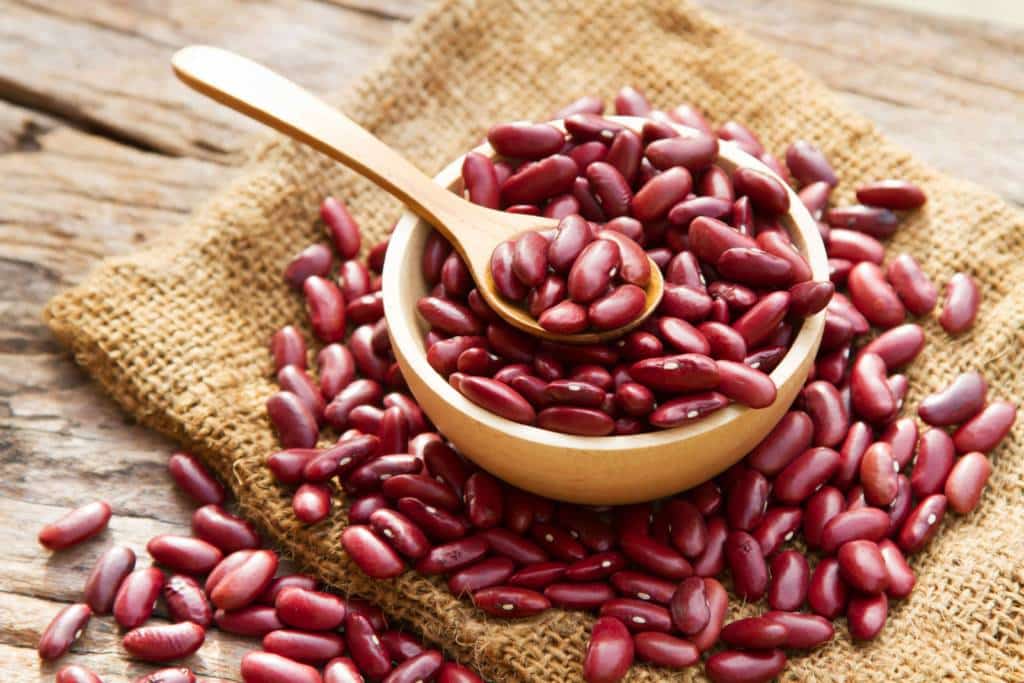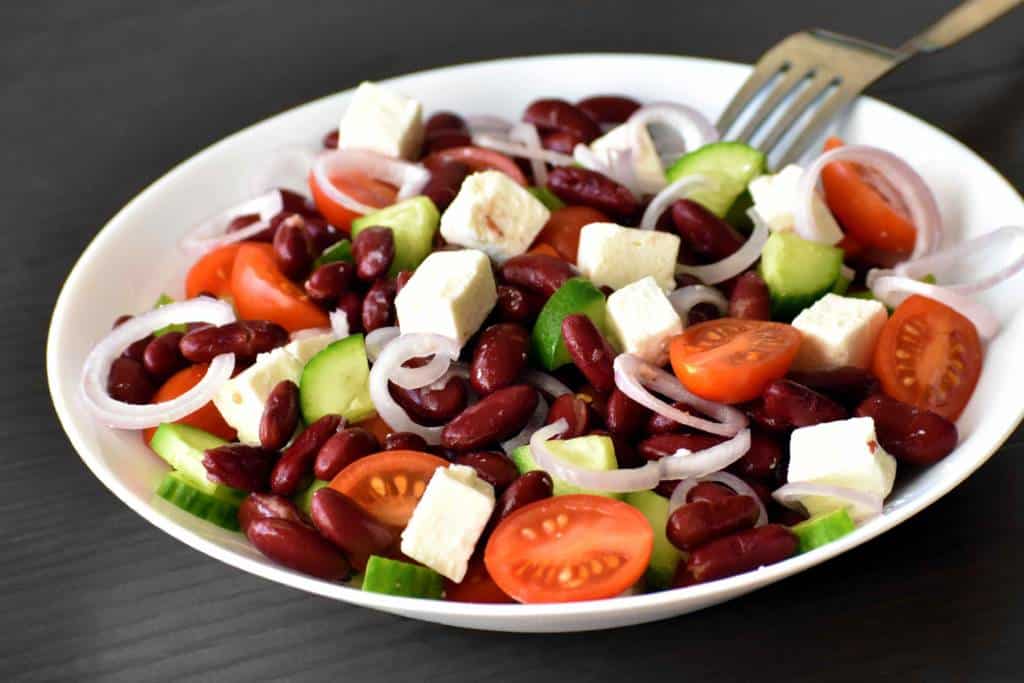
The kidney bean is a variety of the common bean (Phaseolus vulgaris). It is named for its visual resemblance in shape and colour to a kidney. Red kidney beans should not be confused with other red beans, such as adzuki beans.

Phaseolus vulgaris, commonly known as kidney beans, is a legume or a common dried bean. The name comes from the human kidney due to its uncanny resemblance. Also, kidney beans contain protein equivalent to vegetables and are a rich source of fibre. They’re both vegan and an excellent substitute for meat products.
Furthermore, there are many long-term health benefits of consuming kidney beans, including, but not limited to, prevention of several types of cancers, weight loss, and regulating blood sugar. Kidney beans are affordable, healthy, and essential to a complete diet. Therefore, they are popular in developing countries.
Kidney beans contain many bioactive compounds, minerals, nutrients, and essential amino acids. It’s an all-in-one package for a healthy diet! There are several ways to consume kidney beans, whether in a curry or a dessert. Kidney beans are beneficial to human health, and using them as a meat substitute also helps reduce the environmental footprint created by raising cattle for meat.
Kidney beans were developed through artificial selection by crossing several types of early beans. The first ancestor of today’s kidney bean was first cultivated by indigenous tribes in Central America almost 8000 years ago. After hybridisation, artificial selection by the local people, and years of evolution, many common bean varieties emerged. Today, kidney beans are an essential part of the Indian, Caribbean, South American, Spanish, and Indonesian diet.
Kidney beans are classified into four types:
Although a part of the same family of beans, they differ in colour, shape, taste, and nutritional content.
100g of kidney beans contain:
Minerals:
 100vw, 1024px” data-lazy-src=”https://www.healthifyme.com/blog/wp-content/uploads/2022/01/75269024sst1641271504-1024×683.jpg” /></a></figure>
<p>Kidney beans contain various vitamins like vitamin B1, vitamin B2, vitamin B3, vitamin B5, vitamin B6, vitamin B9, <a href=) vitamin C, vitamin E, and vitamin K. They also contain bioactive compounds that help in regulating metabolism and are beneficial for health.
vitamin C, vitamin E, and vitamin K. They also contain bioactive compounds that help in regulating metabolism and are beneficial for health.
For example, according to research studies, substances like phenolics, starch blockers, phytic acid, and anthocyanins are beneficial bioactive compounds.
Kidney beans help reduce the chances of certain types of cancers, such as pancreatic cancer and colon cancer. It is because kidney beans are fibrous and promote anti-cancerous effects in the gut. When these fibres pass to our colon, they are fermented by bacteria. It results in the formation of compounds, which reduce the risk of colon cancer.
A meta-analysis suggests that the regular intake of kidney beans also reduces the risk of colorectal polyps using a similar mechanism. Moreover, another study indicates that the intake of kidney beans may reduce the risk of pancreatic cancer.
Kidney beans have a low glycemic index value. It means that their consumption does not elevate blood glucose levels to a large extent in a short period. They have bioactive compounds like phenolics, anthocyanin, resistant starch and other factors which help protect against the development of diabetes and show antioxidant effects.
Research shows that replacing carbohydrate-rich foods with red kidney beans helps reduce postprandial blood glucose levels. It was a result of the study on diabetic and non-diabetic participants. Furthermore, kidney bean intake may lead to a significant decrease in developing diabetes at a late age.
Metabolism is the chemical reaction in the body’s cells. Specific proteins help control these reactions. For example, it converts the food you eat into energy, which allows you to do everything from moving to thinking and growing.
By regulating the glycemic content of the blood, kidney beans significantly regulate metabolism. Also, the presence of fibres in kidney beans promotes a healthy metabolism.
Research suggests that the regular intake of kidney beans may help reduce the risk of cardiovascular diseases. It is because of the hypocholesterolemic properties of kidney beans. When used as a meat substitute, kidney beans prove pretty beneficial.
Australian research suggests that a regular intake of kidney beans leads to decreased LDL cholesterol, which essentially improves overall heart health. Moreover, kidney beans contain less saturated fat and high amounts of protein, contributing to a healthy heart. Moreover, the potassium in kidney beans also contributes to better heart health by promoting better muscle functioning in the heart.
Many studies explain the weight loss properties of regular consumption of kidney beans. For example, a study shows that adults who consumed beans four times a week lost more weight than others. It is because of the high amount of fibre in kidney beans. It acts as starch blockers and proteins. People also use starch blockers as weight loss supplements. They inactivate the starch-digesting enzymes in our bodies.
Many people adopt a low-carb diet to substitute carbs with fibrous and protein-rich foods like kidney beans. The high amount of fibres make you feel satiated and keep you full for long. As a result, the body demands less food consumption. At the same time, the high quantity of proteins satisfies the body’s energy demands.
Dietary fibres increase the weight and size of your stool to soften it, which helps in maintaining bowel health.
Every hundred grams of kidney beans contains 5.7 g of fibre. A study suggests that dietary fibres can prevent the risk of chronic diseases like colon cancer. It improves overall gut health by regulating bowel movements. As a result, they can prevent constipation, regulate metabolism and lead to a healthier lifestyle.
According to research, there is a high content of complex carbohydrates and dietary fibres in kidney beans. As a result, it lowers cholesterol levels in the blood. Dietary fibres form a gel-like substance in the stomach. These substances surround the cholesterol and prevent its reabsorption into the body. Kidney beans promote the growth of beneficial gut bacteria. These bacteria reside in the large bowel.
The presence of vitamin B1 in kidney beans contributes significantly to healthy cognitive functioning. Vitamin B1 synthesises acetylcholine, an important neurotransmitter. It also ensures proper brain activity and boosts concentration and memory. In addition, a study suggests that it slows down the adverse effects caused by diseases like Alzheimer’s and dementia.
Manganese found in kidney beans aid the body’s antioxidant defences. As a result, it efficiently destroys harmful free radicals. That makes kidney beans a super beneficial antioxidant-rich food. According to a list of the top 20 food sources of antioxidants, dried red kidney beans rank third. The total antioxidant capacity per serving size of kidney beans is 13259 in half a cup serving size.
Packed food items are full of preservatives. These preservatives contain sulphites which are considered toxic. Kidney beans have molybdenum which detoxifies the body of sulphites. People with sulfite allergies should have kidney beans as it helps reduce the symptoms of the allergies. To detoxify your body from the harmful effects of sulphites, simply boil the raw beans for ten minutes.

Preparation time- 7 minutes
Servings- 2
Your kidney bean salad is ready to enrich you!
Preparation time- 10 minutes
Servings- 6
Uncooked kidney beans contain a harmful chemical compound on their coating. It includes phytohemagglutinin (PHA) and lectins, which may adversely affect gut health. As a result, it can cause vomiting and diarrhoea. So, be sure to soak and thoroughly cook kidney beans before consumption.
Kidney beans contain antinutrients, which decrease the nutritional value of other foods. In addition, some compounds like protease inhibitors and starch blockers may also hinder the digestion process by inactivating several digestive enzymes. However, you can quickly eliminate these compounds by soaking the beans before cooking them.
Soaking them for 30 minutes is enough.
Moreover, canned kidney beans are safe for consumption since they’re cooked and disinfected before the canning process.
Kidney beans have many health and environmental benefits. For example, it helps reduce the risk of colon and pancreatic cancer, regulating the glycemic index, reducing cholesterol and weight loss effects. In addition, substituting meat with kidney beans can help reduce the carbon footprint and help the environment in the long run.
There are several ways to cook and consume kidney beans. From a comforting pasta soup to a sweet dessert, kidney beans are very versatile. In addition, these are commercially available all year round, eco-friendly, and affordable. Thus, integrating kidney beans into your diet will positively impact your life.